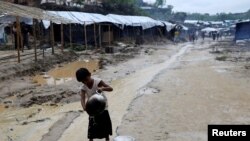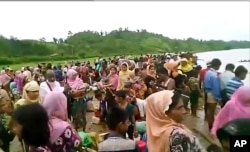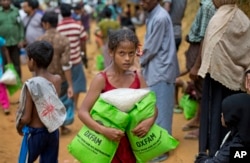A mass oral cholera vaccination campaign for hundreds of thousands of Rohingya refugees and host communities is taking place in Bangladesh. The campaign is led by the Ministry of Health and supported by the World Health Organization and U.N. Children’s Fund.
In the last week, nearly 10,300 cases of diarrhea have been reported in the makeshift settlements and camps for more than one-half-million Rohingya refugees in Cox’s Bazar, Bangladesh. So far, no case of cholera has been discovered and U.N. agencies want to keep it that way.
The World Health Organization says the life-saving oral cholera vaccination campaign, which began Tuesday, is intended to protect vulnerable refugees. Cholera thrives in overcrowded, unhygienic conditions and poses a risk for the Rohingya.
WHO spokesman Christian Lindmeier tells VOA the vaccination campaign is the world’s second largest after one conducted in Haiti in 2016 following Hurricane Matthew. He says a target population of more than 650,000 newly arrived Rohingya refugees and host communities over the age of one will be vaccinated in the first round.
“It goes, as you say, with a whole, large team of medical and health staff through the camps and makeshift and spontaneous settlements in Ukhiya and the Teknaf areas…More than 200 mobile vaccination teams are implementing this campaign," said Lindmeier. "So, it is a huge effort.”
Lindmeier says a second round of vaccinations will begin October 31. He says it will target 250,000 children between the ages of one and five, with a second dose of the oral vaccine for added protection.
While a vaccine can provide life-saving protection against cholera, the WHO says it does not replace other traditional control measures. It says access to clean water, as well as good sanitation and hygiene, are critical for keeping the disease at bay.






